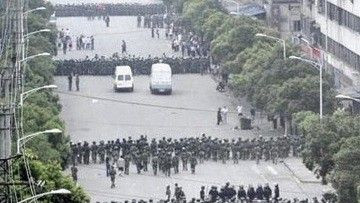Three Chinese Muslim Hijackers Receive Death Sentence

Three Chinese men received the death sentence on Tuesday for attempting to hijack a passenger plane in northwestern China in June, while another was given a life sentence. The religious influence that allegedly was behind the attempt could be a reason behind the court's death penalty decision.
According to China Daily, a witness said the group of hijackers shouted religious extremist slogans as they attacked the airline crew and passengers.
The incident involved six men and occurred on June 29 aboard a plane taking off from Hotan Airport in China's Xinjiang Uygur autonomous region en route to the regional capital of Urumqi. The group used covered metal crutches and explosives to attack pilots in the cockpit.
The court concluded that the Muslim group had been heavily influenced by extremist ideals and had been planning an attack as early as October 2011. Specific plans for the hijacking, including investigating airport security and the specific airplane layout, were formulated in mid-May, according to the prosecution.
The Intermediate People's Court in Hotan Prefecture ruled the three men sentenced to death -- Musa Yvsup, Arxidikali Yimin and Eyumer Yimin -- were guilty of organizing, leading or participating in a terrorist group, hijacking the aircraft and attempting to detonate explosives on the aircraft. Alem Musa, who received the life imprisonment sentence, pleaded guilty to playing a minor role in the hijacking.
The group intended to blow up the aircraft and die along with the passengers but was stopped by crew members and passengers while attempting to trigger the explosives. Two of the six hijackers sustained injuries during the mid-flight fight and later died despite receiving medical treatment.
Though no crew or passenger members were killed, 24 were injured, and an economic loss of 28.5 million yuan ($4.58 million) was reported in a court document.
China has taken punishing the people it calls Muslim extremists very seriously, blaming the many violent outbreaks in the northwestern region to the Islamic followers in the area. Beijing has been wary of the proximity of northwestern China to neighboring Muslim states and is willing to take extreme measures to contain uprisings in the area.
In 2011, multiple attacks shook Xinjiang, where Muslim Uighurs, an ethnic and religious minority in the region, frequently clash with the ethnic majority, Han Chinese. Muslim Uygurs in the area have long protested the religious controls imposed by Beijing. The tension between the two ethnic groups has tested the Chinese government's ability to keep Xinjiang from attempting to split off from the mainland.
© Copyright IBTimes 2024. All rights reserved.






















